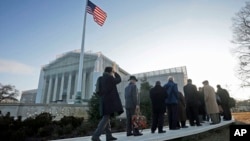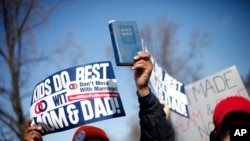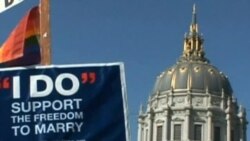WASHINGTON —
The U.S. Supreme Court has heard the first of two landmark cases on same-sex marriage. Hundreds of demonstrators gathered outside the court Tuesday as justices heard arguments on the constitutionality of a California state law barring gay people from marrying.
Excitement and anticipation could be seen in the faces of John Lewis and Stuart Gaffney, partners of 25 years.
“We would not want to be anywhere else right now," said Gaffney. "This is history in the making.”
The San Francisco couple wed during a brief period when California allowed same-sex marriage. That was before the passage of a 2008 ballot initiative, known as Proposition 8, that restricted marriage to heterosexuals in the state. Prop 8’s constitutionality has been contested for the last four years. Tuesday, the case was aired before the Supreme Court.
Attorney Ted Olson argued on behalf of California gay couples that want to marry. He spoke with reporters afterwards.
“The broadest argument we made is that it is just wrong, it is not consistent with the ideals, the laws, and the constitution of this country, to take our gay and lesbian brothers and sisters and put them in a class and deny them rights that we give to everyone else," said Olson.
Attorney Charles Cooper argued in favor of retaining Prop 8.
“We believe that Proposition 8 is constitutional, and that the place for the decision to be made regarding redefining marriage is with the people, not with the courts," said Cooper.
In considering Prop 8, the Supreme Court could affirm the right of individual states to ban same-sex marriage. It could also strike down the law only in California or it could strike down all such laws in every state, opening the door to gay marriage nationwide. The court could also sidestep constitutional issues entirely by finding Prop 8 supporters have no legal standing to defend the law.
Such an outcome would leave intact a lower court ruling that struck down the ballot initiative. Gay Californians would be able to marry. But bans in other states would be left untouched, and questions about marriage rights for gay people would be unresolved.
John Lewis and Stuart Gaffney want a sweeping ruling that settles the issue once and for all.
“We are Americans," said Lewis. "And we are here on the steps of the United States Supreme Court, because every single American, without exception, should have the freedom to marry the person that they love.”
Opponents of same-sex marriage were also present outside the court. Tammy Fuentes came to Washington with a Rhode Island church group.
“We believe that marriage is between a man and a woman," said Fuentes. "We do not want to redefine marriage. God created a man and a woman to reproduce. We all know men cannot have kids [by themselves], and two women cannot reproduce, either.”
Wednesday, the Supreme Court will hear arguments on the constitutionality of a law that bars the U.S. government from recognizing same-sex unions. Decisions are expected in June.
Related video footage from outside the Supreme Court
Excitement and anticipation could be seen in the faces of John Lewis and Stuart Gaffney, partners of 25 years.
“We would not want to be anywhere else right now," said Gaffney. "This is history in the making.”
The San Francisco couple wed during a brief period when California allowed same-sex marriage. That was before the passage of a 2008 ballot initiative, known as Proposition 8, that restricted marriage to heterosexuals in the state. Prop 8’s constitutionality has been contested for the last four years. Tuesday, the case was aired before the Supreme Court.
Attorney Ted Olson argued on behalf of California gay couples that want to marry. He spoke with reporters afterwards.
“The broadest argument we made is that it is just wrong, it is not consistent with the ideals, the laws, and the constitution of this country, to take our gay and lesbian brothers and sisters and put them in a class and deny them rights that we give to everyone else," said Olson.
Attorney Charles Cooper argued in favor of retaining Prop 8.
“We believe that Proposition 8 is constitutional, and that the place for the decision to be made regarding redefining marriage is with the people, not with the courts," said Cooper.
In considering Prop 8, the Supreme Court could affirm the right of individual states to ban same-sex marriage. It could also strike down the law only in California or it could strike down all such laws in every state, opening the door to gay marriage nationwide. The court could also sidestep constitutional issues entirely by finding Prop 8 supporters have no legal standing to defend the law.
Such an outcome would leave intact a lower court ruling that struck down the ballot initiative. Gay Californians would be able to marry. But bans in other states would be left untouched, and questions about marriage rights for gay people would be unresolved.
John Lewis and Stuart Gaffney want a sweeping ruling that settles the issue once and for all.
“We are Americans," said Lewis. "And we are here on the steps of the United States Supreme Court, because every single American, without exception, should have the freedom to marry the person that they love.”
Opponents of same-sex marriage were also present outside the court. Tammy Fuentes came to Washington with a Rhode Island church group.
“We believe that marriage is between a man and a woman," said Fuentes. "We do not want to redefine marriage. God created a man and a woman to reproduce. We all know men cannot have kids [by themselves], and two women cannot reproduce, either.”
Wednesday, the Supreme Court will hear arguments on the constitutionality of a law that bars the U.S. government from recognizing same-sex unions. Decisions are expected in June.
Related video footage from outside the Supreme Court







